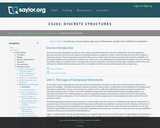
This course describes discrete mathematics, which involves processes that consist of sequences of individual steps (as compared to calculus, which describes processes that change in a continuous manner). The principal topics presented in this course are logic and proof, induction and recursion, discrete probability, and finite state machines. Upon successful completion of this course, the student will be able to: Create compound statements, expressed in mathematical symbols or in English, to determine the truth or falseness of compound statements and to use the rules of inference to prove a conclusion statement from hypothesis statements by applying the rules of propositional and predicate calculus logic; Prove mathematical statements involving numbers by applying various proof methods, which are based on the rules of inference from logic; Prove the validity of sequences and series and the correctness or repeated processes by applying mathematical induction; Define and identify the terms, rules, and properties of set theory and use these as tools to support problem solving and reasoning in applications of logic, functions, number theory, sequences, counting, probability, trees and graphs, and automata; Calculate probabilities and apply counting rules; Solve recursive problems by applying knowledge of recursive sequences; Create graphs and trees to represent and help prove or disprove statements, make decisions or select from alternative choices to calculate probabilities, to document derivation steps, or to solve problems; Construct and analyze finite state automata, formal languages, and regular expressions. (Computer Science 202)
- Subject:
- Applied Science
- Computer Science
- Material Type:
- Full Course
- Provider:
- The Saylor Foundation
- Date Added:
- 11/16/2011

